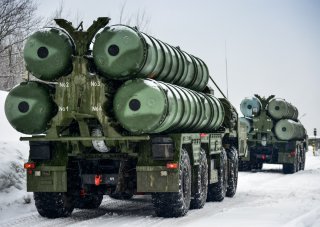Turkish Officials Seek U.S. Compromise Over Russian S-400 Missiles
With no easy solution in sight, the ongoing diplomatic impasse between Washington and Ankara over Turkey’s S-400 systems is set to roil U.S.-Turkish defense relations into the foreseeable future.
Turkey has proposed a solution to the ongoing crisis stemming from Ankara’s earlier purchase of the Russian S-400 missile defense system. Washington has long insisted that Turkey should decommission its imported S-400 systems; Ankara, meanwhile, has expressed interest in a possible compromise arrangement.
In an interview earlier this month, Turkey’s Defense Minister Hulusi Akar offered what has since been termed the “Crete model”: “We’ve said this before, whatever the model used for the S-300 on Crete, we’re open to negotiating,” he stated.
What exactly is the Crete model, and can it possibly work?
In the mid-1990s, Cyprus was in search of a way to deter Turkish flights within its airspace. With U.S. aid not in the cards, Cyprus turned to Russia with an ambitious import contract for the S-300 surface-to-air missile system. Ankara promptly announced that it views Cyprus’s S-300 deal as an existential threat, signaling retaliatory measures up to and including full-scale war if the missile systems were not removed. The resulting crisis continued to escalate until the feuding sides reached a compromise of sorts: Cyprus’s S-300 systems were transferred to Greece’s military and stored on the Greek island of Crete.
In invoking this episode as a possible compromise arrangement, Turkish officials are suggesting two provisos. The first is that Turkey is prepared to keep its S-400s in a state that is not fully operational. As Akar put it, “It’s not as if we’ll always use them. These systems are used according to the state of threats. We will make decisions based on that.” The second is that Ankara appears to be willing to explore a scenario where its S-400 systems are stored indefinitely on non-Turkish, non-North Atlantic Treaty Organization (NATO) territory. With these concessions, Turkey hopes to be invited back to the F-35 program (from which it was removed following the S-400 deal) and to lift current U.S. sanctions under the Countering America’s Adversaries Through Sanctions Act (CAATSA), all while keeping the S-400 systems that it purchased from Russia in 2017.
But Ankara’s proposal is not without significant blindspots. For one, there is no indication that the Biden administration is willing to accept the S-400 on Turkish soil even in an unactivated state. Former President Donald Trump floated some version of the storage compromise as early as 2019, but it never gained meaningful traction. This means that the S-400 would have to be housed outside of Turkey but, here too, there is a problem: there is no obvious, mutually agreeable place to keep it. Neither Greece nor the rest of Europe is likely to tolerate the S-400 in Turkish-aligned Northern Cyprus, while the possible transfer of Turkish S-400’s to Libya is almost certainly a nonstarter for NATO high command. Finally, there is the fact that the S-400 is a markedly more advanced weapon than the S-300 and poses greater military risks to Turkey’s neighbors, making it more difficult to eke out a possible compromise.
With no easy solution in sight, the ongoing diplomatic impasse between Washington and Ankara over Turkey’s S-400 systems is set to roil U.S.-Turkish defense relations into the foreseeable future.
Mark Episkopos is the new national security reporter for the National Interest.
Image: Reuters

